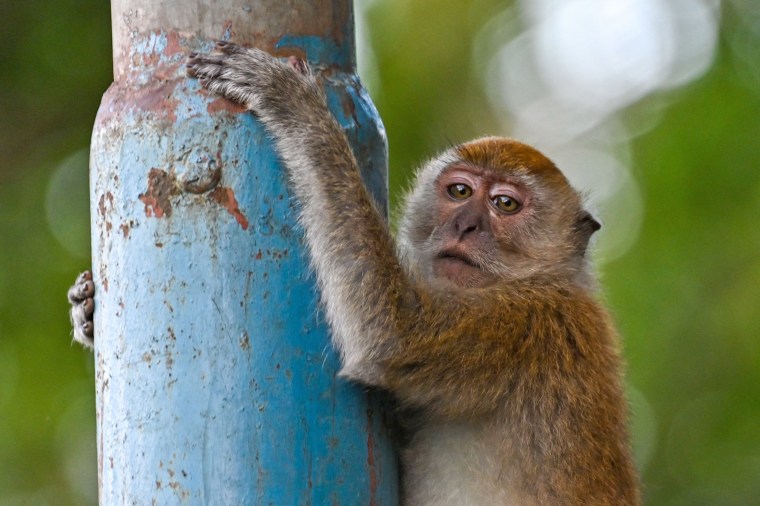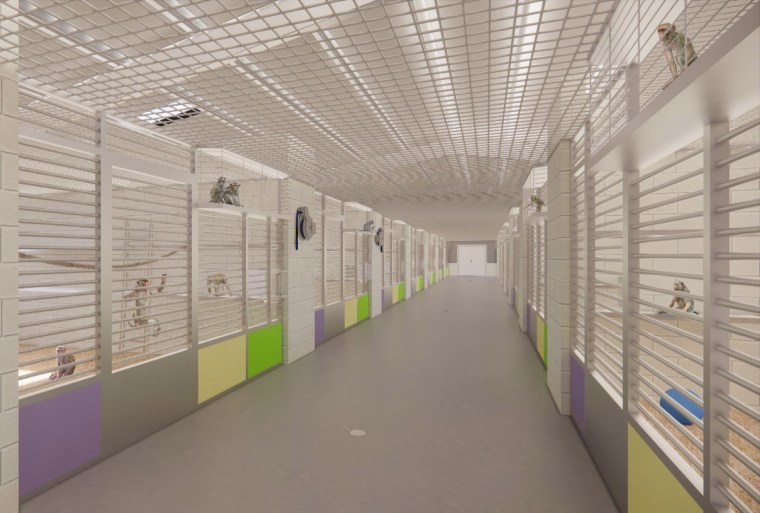Residents have voiced concerns about the facility itself to the possibility that monkeys would escape — which has occasionally happened at other facilities in the U.S., including one run by Oregon Health & Science University in Portland, though with no reports of harm to nearby residents.
“We’re looking at a jungle: noise, stink and the possibility of diseases,” said Penny Reynolds, who lives across from the land set aside for the facility in Bainbridge.
Safer Human Medicine has assured residents that it would take every precaution to make sure all waste would be contained in its facilities and sent to the city wastewater treatment plant. It also said that most noise would stay within the facility and that there wouldn’t be a “noticeable smell.”
Greg Westergaard, the CEO of monkey breeder Alpha Genesis, says a lot goes into setting up monkey breeding facilities.
“There’s a lot of training involved; there’s a tremendous amount of infrastructure involved,” he said. “It’s going to smell, and you’re going to have runoff from the cleaning.”
Bainbridge residents have pointed to the backgrounds of some of Safer Human Medicine’s executives — two of whom previously served in leadership positions at companies that have come under scrutiny — as reasons to doubt their commitment.
Safer Human Medicine CEO Jim Harkness was the chief operating officer of Envigo, a company that pleaded guilty last week to neglecting thousands of dogs and agreed to pay a record $35 million fine. Chief Operating Officer Kurt Derfler left his job at Charles River Laboratories last year, just months after the Justice Department subpoenaed it as part of its investigation of possible wild monkey smuggling from Cambodia. Charles River Laboratories said at the time that any concerns about its role were “without merit.”
Neither Harkness nor Derfler was individually charged in relation to those cases.
Safer Human Medicine declined interview requests. It said by email, “Envigo was operating during unprecedented circumstances brought on by the pandemic.” It added, “We have been committed to operating responsibly and ethically for decades in this field and we will continue doing just that.”

Safer Human Medicine said it wouldn’t be using wild-caught macaques — which can carry viruses like herpes B. The macaques would come from Asia, it said, without specifying where.
The community organizing in Bainbridge has moved the needle. Rick McCaskill, the executive director of the Development Authority of Bainbridge and Decatur County, said that what was once billed as a “tremendous investment” of almost $400 million and 260 jobs quickly turned sour. After backlash from the community arose, Bainbridge leaders voted in February to rescind their support for the Safer Human Medicine project.
“We felt like the divisiveness and the unrest in the community was outweighing the benefit of the project,” McCaskill said.
Research monkeys are bred at the seven National Primate Research Centers, each with its own breeding colony, as well as other facilities across the country. The National Primate Research Centers often use rhesus macaques, while pharmaceutical companies tend to use long-tailed macaques — the type Safer Human Medicine plans to breed.
There has been some movement away from animal testing for drug development, which was once required by the U.S. In 2022, President Joe Biden signed the FDA Modernization Act 2.0, allowing for alternatives to animals when possible. This year, several members of Congress introduced a bill to take it a step further — and facilitate a move away from animal research.
“It’s likely going to be a collection of alternatives, from AI to computer models to organs on a chip,” said Jim Newman, the communications director for Americans for Medical Progress, a group that advocates for medical testing on animals when needed. “But what we currently have available can only reduce animals by a certain amount.”

For now, researchers still depend on monkeys for some testing, and some animal researchers say the U.S. is experiencing a shortage of long-tailed macaques — reporting a more than 20% drop in imports in 2020 after China cut off its exports. They say prices for long-tailed macaques are skyrocketing.
Safer Human Medicine says it sees its planned facility as an answer to the shortage. It said it would start out with 500 to 1,000 monkeys and scale up. It said the money to build the facility would come from industry and private funding within the U.S. It wouldn’t share names.
It’s not entirely clear how much of the community is against the facility. Some local politicians who campaigned on opposing it didn’t win in recent elections, though it’s not apparent that their losses had anything to do with those positions.
Still, Faircloth said her group has no plans to back down.
“If we don’t stand up for our rights, then we’re just going to be rolled over,” she said. “We just can’t let that happen.”






